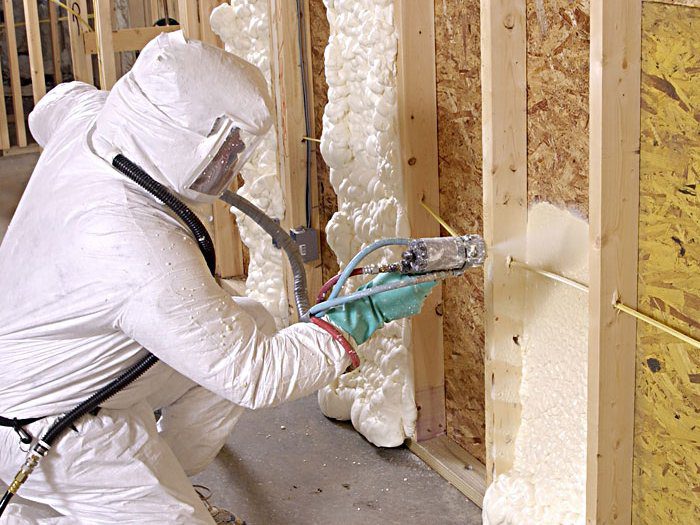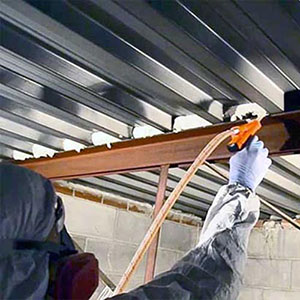How Spray Foam Can Improve Energy Efficiency in Your Home
How Spray Foam Can Improve Energy Efficiency in Your Home
Blog Article
Spray Foam: The Ultimate Service for Air Sealing and Insulation
Spray foam insulation has become a leading service for efficient air sealing and thermal insulation, supplying a special mix of properties that set it besides traditional techniques. Its ability to increase and fill gaps makes it specifically effective in protecting against air leakage, which can significantly affect power performance. Comprehending the full range of its advantages, installment processes, and comparisons with other insulation types is important for making notified choices. As we check out these facets, the implications for both brand-new constructions and retrofits come to be progressively substantial. What elements should influence your option?
What Is Spray Foam?
Spray foam is a flexible insulation product that integrates the concepts of air sealing and thermal resistance to enhance power efficiency in buildings. Composed largely of polyurethane or various other comparable substances, spray foam is used as a fluid that expands upon contact with surfaces, creating a solid, constant layer of insulation. This special residential or commercial property enables it to load spaces, fractures, and spaces that typical insulation products may neglect, supplying a superior air seal.
There are two main kinds of spray foam: open-cell and closed-cell. Open-cell spray foam is lighter and a lot more flexible, providing outstanding noise absorption and a reduced R-value per inch - Spray Foam. In comparison, closed-cell spray foam is denser, supplying a greater R-value, moisture resistance, and added structural honesty to constructing parts
The application procedure commonly entails specialized tools, making sure a seamless application that follows numerous substratums, including concrete, timber, and metal. This flexibility makes spray foam appropriate for both brand-new constructions and retrofitting existing structures. Its capability to develop an airtight obstacle dramatically adds to reducing energy usage and enhancing interior air top quality, thus making it a recommended choice amongst home owners and home builders alike.
Advantages of Spray Foam Insulation
Among the most significant benefits of spray foam insulation is its exceptional capability to produce a constant air obstacle, which successfully lessens power loss. Unlike standard insulation products, spray foam broadens to fill up fractures and spaces, making sure that air leakage is substantially lowered. This particular not only boosts power effectiveness however likewise results in reduce utility costs with time.
In addition, spray foam insulation supplies exceptional thermal resistance, contributing to a more secure interior atmosphere. Its high R-value per inch enables effective insulation in constrained rooms, making it suitable for attics, walls, and crawl spaces. The moisture-resistant residential properties of spray foam help prevent mold and mildew and mildew development, promoting healthier living problems.
An additional vital benefit of spray foam insulation is its sound-dampening top qualities (Spray Foam). It successfully reduces sound transmission between spaces, creating a quieter and a lot more comfortable home setting. The durability of spray foam likewise stands apart, as it does not droop or work out over time, keeping its performance throughout its lifespan
Just How Spray Foam Functions
Comprehending just how spray foam insulation works is important for valuing its efficiency in air sealing and thermal resistance. Spray foam insulation contains two main elements: isocyanate and polyol material. When these parts are combined, they go through a chain reaction that causes the product to expand quickly, developing a thick foam that fills fractures, voids, and cavities.
As the foam expands, it follows surface areas, creating an airtight seal that substantially reduces air infiltration. This particular makes spray foam insulation very effective at protecting against drafts and moisture penetration, which can cause power Get More Information loss and damage gradually. In addition, the closed-cell variation of spray foam uses premium thermal resistance as a result of its rigid structure, effectively lessening heat transfer.
The unique residential or commercial properties of spray foam allow it to conform to uneven surfaces, making sure comprehensive protection and a seamless obstacle. Because of this, spray foam insulation not only enhances power effectiveness but additionally adds to enhanced interior air high quality by minimizing the buildup of irritants and pollutants. Ultimately, recognizing the technicians behind spray foam underscores its duty as a premium choice for insulation and air sealing in both industrial and household applications.
Installation Process Summary

Prior to installment, the room should be sufficiently cleaned and prepped, making certain that surface areas are without wetness, dust, and particles. This step is vital due to the fact that contaminants can compromise bond and general efficiency. Once the area is prepared, the application includes mixing both components of the spray foam, which broadens upon get in touch with and fills up spaces successfully.
Educated experts must carry out my website the setup, using specific devices to make sure consistent protection and optimal density. Safety precautions, including wearing safety equipment and making sure appropriate ventilation, are necessary throughout this process. After application, the foam usually cures quickly, forming a strong obstacle that improves energy efficiency.
Contrasting Spray Foam to Standard Insulation
When examining insulation choices, spray foam insulation sticks out in comparison to traditional products such as fiberglass and cellulose. One of the primary advantages of spray foam is its superior air securing abilities. Unlike fiberglass and cellulose, which can enable air infiltration, spray foam expands upon application, loading voids and gaps to create an impermeable seal. This causes improved power performance, as much less heated or cooled air runs away the home, leading to lower energy costs.
Additionally, spray foam provides a higher R-value per inch than typical insulation types, supplying even more effective thermal resistance in a thinner account. This particular is especially helpful precede with minimal cavity depth. Spray foam is resistant to dampness and mold development, which can be a substantial worry with cellulose and fiberglass, especially in humid environments.
Nonetheless, spray foam insulation generally carries a higher in advance cost than its standard counterparts. Homeowners need to consider this initial investment against long-lasting energy financial savings and efficiency benefits. Ultimately, while both insulation types serve their function, spray foam becomes an extra advanced service for contemporary insulation demands, particularly in terms of air sealing and thermal effectiveness.

Verdict
In summary, spray foam insulation represents a highly efficient option for attaining optimal air sealing and thermal resistance. Its distinct properties, consisting of dampness resistance and sound dampening, make it appropriate for various applications in both new buildings and retrofitting projects (Spray Foam). The preliminary costs may be greater compared to standard insulation products, the long-lasting advantages, such as significant power financial savings and improved indoor air quality, justify the financial investment and highlight its value in contemporary structure methods.
Spray foam insulation has actually arised as a leading remedy for reliable air sealing and thermal insulation, offering an unique combination of more properties that set it apart from standard approaches.Spray foam is a flexible insulation product that integrates the principles of air sealing and thermal resistance to boost power performance in structures.When reviewing insulation alternatives, spray foam insulation stands out in comparison to standard materials such as fiberglass and cellulose. Eventually, while both insulation kinds offer their purpose, spray foam arises as a more innovative remedy for contemporary insulation demands, especially in terms of air securing and thermal effectiveness.
In summary, spray foam insulation represents a highly effective service for achieving optimal air sealing and thermal resistance.
Report this page